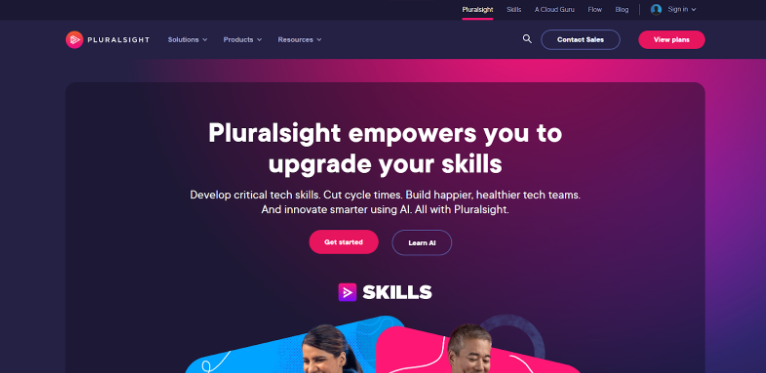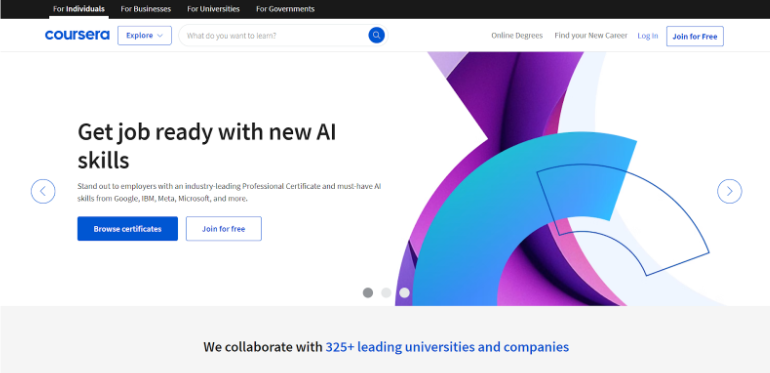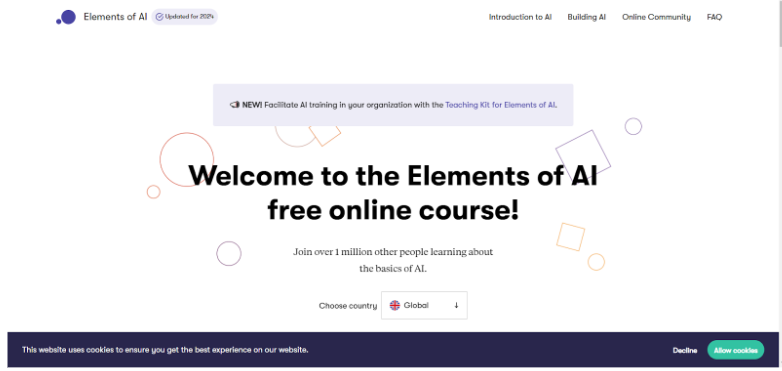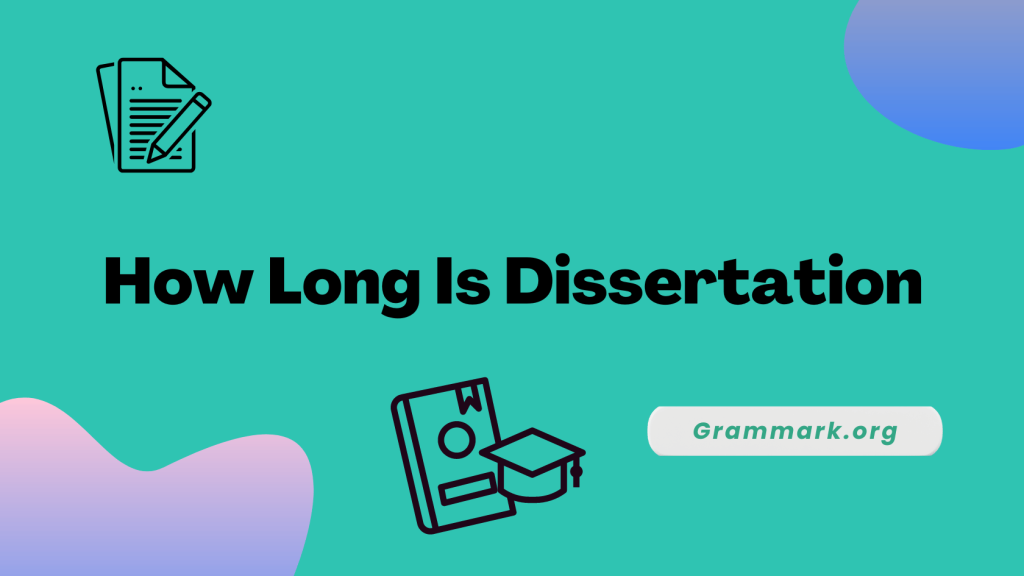Artificial Intelligence (AI) has rapidly evolved from a futuristic concept to an integral part of our daily lives, reshaping industries and creating new opportunities at an unprecedented pace.
Since then, I’ve been exploring various online platforms and found the top 5 AI learning platforms for students, seeking to equip myself with the skills and knowledge that will be crucial in the coming years.
Let us know further which platforms can help you learn!
Top 5 AI Learning Platforms: Quick Overview (2025)
After extensive research, I’ve identified five standout platforms for learning AI. Here’s a quick comparison to help you choose the right one for your needs:
| Platform | Price | Free Trial | Course Duration |
|---|---|---|---|
| Pluralsight | $29/month or $299/year | 10 days | Varies (mostly self-paced) |
| Coursera | Varies (many free courses, paid certificates) | 7 days for most courses | 4-6 weeks per course |
| edX | Varies (many free courses, paid certificates) | Audit most courses for free | 4-12 weeks per course |
| Elements of AI | Free (optional paid certificate) | N/A (free access) | 30-60 hours total |
| Udemy | One-time fee per course (often $10-$20 on sale) | 30-day money-back guarantee | Typically 5-20 hours per course |
Skills And Concepts To Learn From An AI Course
A comprehensive AI course should cover the following key areas:
- Foundations of AI: Understanding what AI is, its history, and its current applications.
- Machine Learning: Supervised, unsupervised, and reinforcement learning algorithms.
- Deep Learning: Neural networks, convolutional neural networks (CNNs), and recurrent neural networks (RNNs).
- Natural Language Processing (NLP): Techniques for processing and analyzing human language.
- Computer Vision: How machines interpret and analyze visual information.
- Robotics: Basics of autonomous systems and how AI is applied in robotics.
- AI Ethics: Ethical considerations in AI development and deployment.
- Programming Skills: Typically Python, with libraries like TensorFlow, PyTorch, or sci-kit-learn.
- Data Analysis: Techniques for collecting, cleaning, and analyzing large datasets.
- AI Project Management: How to plan and execute AI projects in real-world scenarios.
When evaluating these factors across the platforms, I’ve explored the following:
Pluralsight provides a comprehensive tech learning experience with its skill assessments and hands-on labs. It’s particularly strong for those looking to develop practical AI skills alongside broader tech knowledge.
Coursera and edX offer the most academic rigor, with courses from top universities. They’re ideal if you’re looking for a structured, in-depth learning experience that mimics university-level education.
Elements of AI stands out for its accessibility, making it an excellent starting point for absolute beginners or those from non-technical backgrounds looking to understand AI concepts.
Udemy offers the most flexibility in terms of course selection and learning pace. It’s great for filling specific knowledge gaps or learning practical skills, but crafting a comprehensive learning path requires more self-direction.
Top 5 AI Learning Platforms For Students – Explained In Detail
After exploring various options, I’ve found these five platforms to be particularly valuable for students looking to learn AI:
1. Pluralsight
| Attribute | Details |
|---|---|
| Free Trial | 10 days |
| Price | $29/month or $299/year |
| Link | Pluralsight |
Pluralsight stands out as a comprehensive platform for tech-focused learning, including a good selection of AI courses. What I appreciate most about Pluralsight is its emphasis on practical, hands-on learning.
The platform offers a unique “Skill IQ” assessment that helps you identify your current knowledge level and suggests personalized learning paths.

The AI courses on Pluralsight range from beginner to advanced levels, covering everything from basic concepts to cutting-edge technologies.
Many courses include hands-on labs and projects, allowing you to apply what you’ve learned in real-world scenarios. This practical approach has been invaluable in helping me understand how AI concepts translate to actual applications.
Top 3 AI courses on Pluralsight:
- “AI & Generative AI Explained” by Simon Allardice
- “Artificial Intelligence: The Big Picture” by Matthew Renze
- “Getting Started on Prompt Engineering with Generative AI” by Amber Israelsen
Pros:
- High-quality, professionally produced content
- Skill assessments and personalized learning paths
- Extensive library of courses covering various AI topics
- Hands-on labs for practical experience
Cons:
- Monthly subscription can be costly for long-term use
- Some advanced courses require prior programming knowledge
2. Coursera
| Attribute | Details |
|---|---|
| Free Trial | 7 days for most courses |
| Price | Varies (many free courses, paid certificates) |
| Link | Coursera |
Coursera has been my go-to platform for university-level AI courses. Its partnerships with top institutions like Stanford, Google, and DeepMind set Coursera apart.
This means you’re learning from some of the brightest minds in the field, often the same professors teaching at prestigious universities.

I’ve found Coursera’s AI courses to be incredibly well-structured, often part of larger specializations or professional certificate programs.
This allows for a look into specific areas of AI. The platform also offers peer-graded assignments and discussion forums, creating a more interactive learning experience.
Top 3 AI courses on Coursera:
- “AI For Everyone” by Andrew Ng
- “Machine Learning” by Stanford University
- “Google AI Essentials” by Google
Pros:
- Courses from world-renowned universities and companies
- Structured learning paths with specializations and professional certificates
- Many courses can be audited for free
- Active community and peer interaction
Cons:
- Strict deadlines for assignments in some courses
- Premium features and certificates can be expensive
3. edX
| Attribute | Details |
|---|---|
| Free Trial | Audit most courses for free |
| Price | Depends on the course or certification selected |
| Rating | 4.5/5 |
| Link | edX |
edX, like Coursera, offers university-level courses from top institutions. What I particularly appreciate about edX is its MicroMasters programs, which provide deeper, more comprehensive learning experiences in specific AI domains.
These programs can even count towards credit for complete master’s degrees at some universities.

The AI courses on edX range from introductory to advanced levels, covering both theoretical foundations and practical applications.
Many courses include hands-on projects and programming assignments, which I’ve found crucial for solidifying my understanding of complex AI concepts.
Top 3 AI courses on edX:
- “Artificial Intelligence (AI)” by Columbia University
- “Machine Learning and AI with Python” by HarvardX
- “Deep Learning” by IBM
Pros:
- High-quality courses from top universities
- MicroMasters programs for in-depth specialization
- Many courses can be audited for free
- Verified certificates from prestigious institutions
Cons:
- Some courses have fixed start dates
- Advanced courses may require a significant time commitment
4. Elements of AI
| Attribute | Details |
|---|---|
| Free Trial | N/A (free access) |
| Price | Free (optional paid certificate) |
| Link | Elements of AI |
Elements of AI is a unique platform that offers a free, comprehensive introduction to AI concepts without requiring any coding knowledge.
Created by the University of Helsinki and Reaktor, this course has been a game-changer for me in understanding the fundamentals of AI.

What sets Elements of AI apart is its accessibility. The course uses clear explanations, interactive exercises, and real-world examples to demystify complex AI concepts. It’s available in multiple languages, making it a truly global resource for AI education.
Top 3 courses on Elements of AI:
- “Introduction to AI” (free course)
- “Building AI” (free course)
- “Ethics of AI” (free course)
Pros:
- Completely free, high-quality content
- No coding is required, making it accessible to all backgrounds
- Available in multiple languages
- Covers both technical concepts and societal impacts of AI
Cons:
- Limited to introductory-level content
- No hands-on coding exercises for those who want practical experience
5. Udemy
| Attribute | Details |
|---|---|
| Free Trial | 30-day money-back guarantee |
| Price | One-time fee per course (often $10-$20 on sale) |
| Link | Udemy |
Udemy offers a vast marketplace of online courses, including a wide range of AI-related topics. What I appreciate most about Udemy is the variety of teaching styles and course formats available.
You can find everything from quick introductory courses to comprehensive, project-based learning experiences.

Industry professionals, academics, and experienced practitioners create the platform’s AI courses. This diversity of instructors means you can often find unique perspectives and practical insights not available in more traditional academic settings.
Top 3 AI courses on Udemy:
- “Machine Learning A-Z™: Hands-On Python & R In Data Science” by Kirill Eremenko and Hadelin de Ponteves
- “Deep Learning A-Z™: Hands-On Artificial Neural Networks” by Kirill Eremenko and Hadelin de Ponteves
- “Artificial Intelligence A-Z™: Learn How To Build An AI” by Hadelin de Ponteves
Pros:
- Wide variety of courses covering different aspects of AI
- One-time purchase with lifetime access
- Frequent discounts make courses very affordable
- Practical, project-based learning in many courses
Cons:
- Quality can vary between courses
- No unified curriculum or learning path
- Limited interaction with instructors in some courses
Why Take A Course On AI?
As a student in 2024, understanding AI is crucial for several reasons:
- Career Opportunities: AI is creating new jobs and transforming existing ones across industries. Having AI skills makes you more marketable and opens up exciting career paths.
- Problem-Solving Skills: AI courses teach you to approach complex problems systematically, a valuable skill in any field.
- Staying Relevant: As AI continues to evolve, staying up-to-date with the latest developments ensures you remain competitive in the job market.
- Interdisciplinary Applications: AI is being applied in diverse fields like healthcare, finance, and environmental science. Understanding AI allows you to contribute to innovative solutions in your chosen field.
- Ethical Considerations: Learning about AI helps you understand its societal impacts and contribute to responsible AI development and implementation.
The benefits of taking an AI course from a reputable platform include:
- Structured Learning: Courses provide a logical progression of topics, ensuring you build a strong foundation.
- Expert Instruction: Learn from industry professionals and academics at the forefront of AI research.
- Hands-on Experience: Many courses offer practical projects and exercises to apply your knowledge.
- Networking Opportunities: Connect with fellow learners and professionals in the AI community.
- Certifications: Earn recognized credentials to boost your resume and LinkedIn profile.
- Flexibility: Online courses allow you to learn at your own pace and fit studies around your schedule.
Things To Consider While Selecting an AI Course Platform for Students
When choosing an AI course platform, several factors should be taken into account:
- Learning Style: Consider whether you prefer structured, academic-style courses or more flexible, project-based learning.
- Prior Knowledge: Assess your current understanding of AI and choose a platform that offers courses at an appropriate level.
- Time Commitment: Look at the course duration and weekly time requirements to ensure they fit your schedule.
- Budget: Compare the costs of different platforms, considering both short-term and long-term learning goals.
- Certification: If you’re looking to boost your resume, check if the platform offers recognized certificates.
- Hands-on Experience: For practical skills, prioritize platforms that offer coding exercises and projects.
- Instructor Expertise: Look for courses taught by recognized experts in the field.
- Community and Support: Consider platforms with active forums or
Communities for peer support and networking. - Course Updates: AI is a rapidly evolving field, so choose platforms that regularly update their content.
- Specialization Options: If you have specific AI interests (e.g., NLP, computer vision), look for platforms with in-depth courses in those areas.
Related Reads:
Conclusion: Pluralsight Is The Best Platform To Take An AI Course From
After careful consideration, I’ve found Pluralsight to be the best overall platform for learning AI as a student in 2024. Its high-quality content, practical hands-on labs, and personalized learning paths provide a comprehensive and practical learning experience.
The platform’s focus on technology skills beyond just AI also allows for a broader understanding of how AI fits into the larger tech ecosystem. That said, the best platform for you will ultimately depend on your specific goals, learning style, and circumstances.
You should take advantage of free trials and explore multiple platforms to find the best fit for your AI learning journey. Remember, in the fast-paced world of AI, continuous learning is key to staying relevant and competitive.
Ready to start your AI learning journey? Sign up for any of the 5 platforms’ free trials today and take the first step towards mastering AI!


